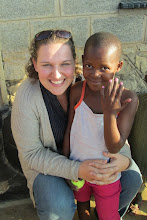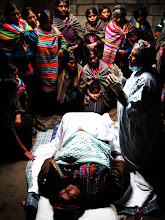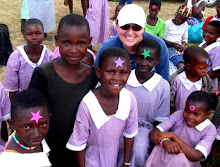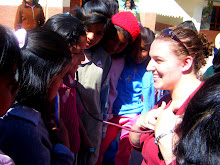This post is about Peace Corps Pets... We love them, rely on them, suffer criticism for them, and often, we wind up in a whole lot of heart-ache.
I have always owned and lived around animals, so when I joined Peace Corps Lesotho (and discovered it was common for PCVs here to have a cat, or even dog in some cases), I was all on-board. While I knew it was risky, I also knew the emotional and psychological benefits, for me personally, would be well worth it... And I was right.
Beginning my very first day in Ha Selomo, I have shared my rondaval with my little white cat, Pina (meaning "song" in Sesotho)... And in those first few days, weeks, and even months at site, she was an incredibly important part of my ability to cope with my new situation and surroundings. On lonely nights, she was around to keep me company. After weekends away, when I wasn't ready to return to the isolation of village, she was my motivation to come home. In attempts to make new Basotho friends, she was an easy conversation starter, breaking the silence with her presence. I can't possibly overstate how important she has been to my service.
Yet Pina's status as an important asset to my happiness, also makes her an incredible liability to my emotional health. On two occasions, she's gotten seriously and mysteriously sick: As a kitten, she must have fallen and temporarily bruised her spine. For a very scary 3-4 days, she lost all coordination and her ability to balance. She stumbled drunkenly around my rondaval, until she eventually lost the ability to use her back legs entirely- resorting to dragging the dead weight of her back legs around, much to my horror. On a second occasion, she ingested some kind of poison, and spent 12+ hours very sick, yowling, and in pain. She recovered both times...But each incident left me terrified and nearly crippled with worry for multiple sleepless nights. I can't possibly explain the terror and misery that sets in when you think you're trapped in a tiny rondaval, in the middle of nowhere, with a potentially dying animal. There's no back up plan. No help. No chance to lessen pain and suffering. No one. Silence. Just you and a very sick animal. You don't sleep... Just dreading that when you wake up, you'll have to clean up a tiny dead body. It's scary.
And the threats to the well-being of Peace Corps pets aren't always things you can control. For as much as the Basotho are kind, generous, and empathetic people with humans, they can also be very uncaring towards animals. This is a shocking adjustment for most Americans, for whom Fido isn't just a dog but rather a bonafide member of the family, complete with his own special food, dishes, toys, and bed. I could not possibly overstate how much the American prediliction to coddle and care for animals absolutely baffles Basotho. It's a MAJOR cultural difference, and one of the first hard-knock lessons PCVs typically learn about this country. Basotho do not treat animals like they have feelings or emotions. They are tools. They serve a purpose, and if they don't, then they aren't worth feeding. This may sound harsh to a westerner, but after living in Lesotho for several years, I've come to understand it... This is a country where children starve and funerals are more common than weddings. To Basotho the idea that Americans would give perfectly good food to an animal while somewhere in the world (or even on our own city street corners) a HUMAN is suffering isn't just stupid, it's nearly criminal. The American preference for animals, in their eyes, often seems heartless and unimaginable. Why would you feed an animal when you could feed a child?
Unfortunately this, combined with a penchant for jealousy, means that our much beloved Peace Corps pets are often at the mercy of people who think and treat animals very differently than we would wish. It's tragic, but I have had MANY PCV friends loose their animals to malicious acts of violence or careless poinsonings. It's beyond heartbreaking every time. Such as the time when my good friend, Amanda had her dog stoned to death by a group of local herd boys in her village, just for sport. Other friends have had their cats killed because their strange and unimaginable habit of allowing the cat in their house illicited suspicions of witchcraft. Other times, host families unknowingly and carelessly poison animals with rat traps and pesticides, simply because it doesn't occur to people to care or ask WHY an animal dies. It's a tough environment for animals in Lesotho.
So I count myself incredibly lucky that the children and my host family have always accepted my strange American pet owning habits, and have adopted Piña as part of the neighborhood. EVERYONE in the areas knows that she is katz ea 'Me Limpho or 'Me Limpho's cat. And I love that now my kids enjoy petting her and come running whenever some little boy decides it'll be fun to throw rocks at her or chase her. Through me, they've come to treat her like an animal deserving of kindness and basic needs, like food and water. They see now that she is useful.... I've never had a snake, scorpion, or live rodent in my house ( although she does quite frequently grace me with dead ones! Ha!). And that seems, to me, to be yet another's small victory in promoting cultural understanding and difference.
Owning a pet in Lesotho can be a big risk, but, in my case, the emotional and psychological benefits have been worth all the worry. :)
With Love from Lesotho... Mary Beth





